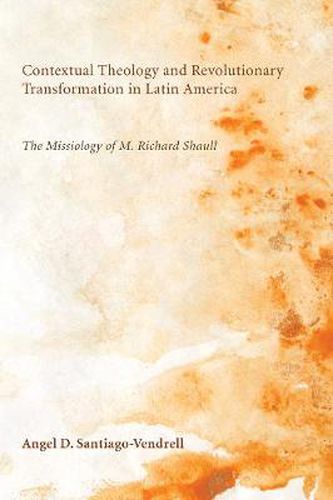Readings Newsletter
Become a Readings Member to make your shopping experience even easier.
Sign in or sign up for free!
You’re not far away from qualifying for FREE standard shipping within Australia
You’ve qualified for FREE standard shipping within Australia
The cart is loading…






This title is printed to order. This book may have been self-published. If so, we cannot guarantee the quality of the content. In the main most books will have gone through the editing process however some may not. We therefore suggest that you be aware of this before ordering this book. If in doubt check either the author or publisher’s details as we are unable to accept any returns unless they are faulty. Please contact us if you have any questions.
U.S. audiences know Latin American liberation theologies largely through translations of Latin American Catholics from the 1970s and beyond. Most of the few known Protestant authors were students of Richard Shaull, whose critical thinking on social change, prophetic Christianity, and dialogue with Marxism and Christian use of Marxist analysis precedes the emergence of the formal schools of liberation theology by two decades. His own education at Princeton, and the education he provided in Brazil, charts the course of Protestant influences into this stream of theological reflection that became a global phenomenon in the latter decades of the twentieth century. Also, Shaull’s career roughly parallels the emergence of the World Council of Churches and the engagement of the Catholic Church–in Latin America and around the world–after the Second Vatican Council. He himself was engaged, and became the flash point, in some of the major conferences, movements, and institutions of the 1960s and beyond. Santiago-Vendrell documents the entrance of the ecumenical movement in Brazil, among the most dramatic transformations in Catholic-Protestant relations around the globe, as well as Shaull’s role in that development. Along the way he notes Shaull’s prophetic and destabilizing role in the worldwide student movement in the 60s and 70s, charting decisions that mark the ecumenical movement. Shaull’s contributions are important for an understanding of the ethical debates in the worldwide, ecumenical Protestant and Orthodox communities. Santiago-Vendrell examines primary, secondary, and historical documents that shine a light on Shaull’s transformation into a contextual theologian of the poor. He offers a definitive view of this North American Protestant missionary who wrote extensively on Latin American liberation theology, the base Christian communities, and how conversion to solidarity with the poor offers transforming possibilities for the mainline churches’ theological identity and practical faith.
$9.00 standard shipping within Australia
FREE standard shipping within Australia for orders over $100.00
Express & International shipping calculated at checkout
This title is printed to order. This book may have been self-published. If so, we cannot guarantee the quality of the content. In the main most books will have gone through the editing process however some may not. We therefore suggest that you be aware of this before ordering this book. If in doubt check either the author or publisher’s details as we are unable to accept any returns unless they are faulty. Please contact us if you have any questions.
U.S. audiences know Latin American liberation theologies largely through translations of Latin American Catholics from the 1970s and beyond. Most of the few known Protestant authors were students of Richard Shaull, whose critical thinking on social change, prophetic Christianity, and dialogue with Marxism and Christian use of Marxist analysis precedes the emergence of the formal schools of liberation theology by two decades. His own education at Princeton, and the education he provided in Brazil, charts the course of Protestant influences into this stream of theological reflection that became a global phenomenon in the latter decades of the twentieth century. Also, Shaull’s career roughly parallels the emergence of the World Council of Churches and the engagement of the Catholic Church–in Latin America and around the world–after the Second Vatican Council. He himself was engaged, and became the flash point, in some of the major conferences, movements, and institutions of the 1960s and beyond. Santiago-Vendrell documents the entrance of the ecumenical movement in Brazil, among the most dramatic transformations in Catholic-Protestant relations around the globe, as well as Shaull’s role in that development. Along the way he notes Shaull’s prophetic and destabilizing role in the worldwide student movement in the 60s and 70s, charting decisions that mark the ecumenical movement. Shaull’s contributions are important for an understanding of the ethical debates in the worldwide, ecumenical Protestant and Orthodox communities. Santiago-Vendrell examines primary, secondary, and historical documents that shine a light on Shaull’s transformation into a contextual theologian of the poor. He offers a definitive view of this North American Protestant missionary who wrote extensively on Latin American liberation theology, the base Christian communities, and how conversion to solidarity with the poor offers transforming possibilities for the mainline churches’ theological identity and practical faith.